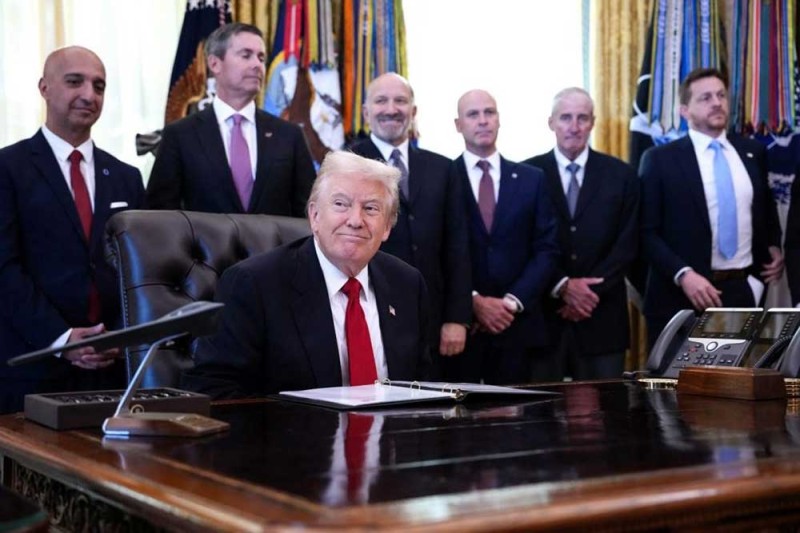
在据报道美国历史上最长的政府停摆结束后,负责任联邦预算委员会于周三(11月12日)发表了一份措辞严厉的声明。该委员会主席玛雅·麦克吉尼亚斯表示,这场政治僵局“一事无成,却对众多民众造成了重大伤害,更不用说对我们在全球的声誉也造成了损害”。
作为这个跨党派预算监督机构的负责人,麦克吉尼亚斯对国会两党均提出了批评。她表示:“决策者们给财政失责赋予了新的含义。”之所以这么说,是因为之前的政治僵局围绕的是一项可能推高赤字1.5万亿美元的医疗保健补贴,而根据CRFB的计算,当前的重启方案通过清空该委员会推崇的“现收现付制”计分卡,又锁定了3.4万亿美元的新增借款。
麦克吉尼亚斯主张:“立法者们应该停止掩盖他们在财政上的鲁莽行为,勇敢直面那些艰难的决定”,“或者至少,遵守他们自己制定的规则。”
这场自10月1日前便开始持续进行的政府停摆,其解决方案于11月10日参议院通过一项修订版的“持续决议案”后得以出台。
尽管重启方案为农业、立法机构和军事建设与退伍军人事务提供了全年拨款,并延长了其余拨款法案的现有资金,但CRFB警告称,政府重启的真正代价是巨大的财政疏忽。
CRFB强调,尽管政府可能很快重启,但根本性的财政不稳定问题依然严峻,并将美国的财政路径描述为“越来越不可持续”。根据国会预算办公室的估算,在2024年11月至2025年10月的12个月间,联邦预算赤字总额高达1.8万亿美元,联邦债务现已接近国内生产总值的100%(目前为99.8%)。
即使眼前的危机已经解决,立法者们仍须在1月底前就本财年剩余时间的九项拨款法案达成一致。他们被警告不得在此过程中进一步增加债务,并被敦促重新设立可强制执行的可自由支配支出上限。
CRFB坚持认为,任何延期方案都必须具备财政责任感,需要包含改革和抵消措施,以确保最终方案是“完全有偿付的——鉴于情况如此糟糕,理想情况下应根据'超级现收现付制'要求,实现两倍的资金覆盖”。
该监督机构在声明结尾表示,“很难想象一个功能失调的政府的底线还能比现在更低。”CRFB呼吁两党共同努力降低医疗成本和减少债务,敦促立法者立即重启政府,并且“不能勾销近期的数万亿美元借款,也不能为未来的借款给自己开具空白支票”。(*)
译者:冯丰
审校:夏林
在据报道美国历史上最长的政府停摆结束后,负责任联邦预算委员会于周三(11月12日)发表了一份措辞严厉的声明。该委员会主席玛雅·麦克吉尼亚斯表示,这场政治僵局“一事无成,却对众多民众造成了重大伤害,更不用说对我们在全球的声誉也造成了损害”。
作为这个跨党派预算监督机构的负责人,麦克吉尼亚斯对国会两党均提出了批评。她表示:“决策者们给财政失责赋予了新的含义。”之所以这么说,是因为之前的政治僵局围绕的是一项可能推高赤字1.5万亿美元的医疗保健补贴,而根据CRFB的计算,当前的重启方案通过清空该委员会推崇的“现收现付制”计分卡,又锁定了3.4万亿美元的新增借款。
麦克吉尼亚斯主张:“立法者们应该停止掩盖他们在财政上的鲁莽行为,勇敢直面那些艰难的决定”,“或者至少,遵守他们自己制定的规则。”
这场自10月1日前便开始持续进行的政府停摆,其解决方案于11月10日参议院通过一项修订版的“持续决议案”后得以出台。
尽管重启方案为农业、立法机构和军事建设与退伍军人事务提供了全年拨款,并延长了其余拨款法案的现有资金,但CRFB警告称,政府重启的真正代价是巨大的财政疏忽。
CRFB强调,尽管政府可能很快重启,但根本性的财政不稳定问题依然严峻,并将美国的财政路径描述为“越来越不可持续”。根据国会预算办公室的估算,在2024年11月至2025年10月的12个月间,联邦预算赤字总额高达1.8万亿美元,联邦债务现已接近国内生产总值的100%(目前为99.8%)。
即使眼前的危机已经解决,立法者们仍须在1月底前就本财年剩余时间的九项拨款法案达成一致。他们被警告不得在此过程中进一步增加债务,并被敦促重新设立可强制执行的可自由支配支出上限。
CRFB坚持认为,任何延期方案都必须具备财政责任感,需要包含改革和抵消措施,以确保最终方案是“完全有偿付的——鉴于情况如此糟糕,理想情况下应根据'超级现收现付制'要求,实现两倍的资金覆盖”。
该监督机构在声明结尾表示,“很难想象一个功能失调的政府的底线还能比现在更低。”CRFB呼吁两党共同努力降低医疗成本和减少债务,敦促立法者立即重启政府,并且“不能勾销近期的数万亿美元借款,也不能为未来的借款给自己开具空白支票”。(*)
译者:冯丰
审校:夏林
The Committee for a Responsible Federal Budget (CRFB) issued a scathing indictment on Wednesday following the reported end of America's longest government shutdown. Maya MacGuineas, president of the CRFB, said the political stalemate “accomplished nothing and caused significant harm to many individuals, not to mention our reputation around the world.”
MacGuineas, leader of a bipartisan budget watchdog, had a bipartisan rebuke for Congress. “Policymakers gave new meaning to fiscal irresponsibility,” she said, since the previous standoff was over a deficit-busting $1.5 trillion in health-care subsidies and the current reopening package locks in what the CRFB calculates as $3.4 trillion of new borrowing by wiping the Pay-As-You-Go (PAYGO) scorecard, a favorite policy of the CRFB.
“Lawmakers should stop papering over their fiscal recklessness and face the tough decisions head-on,” MacGuineas argued, “or at the very least, follow their own rules.”
The resolution to end the shutdown, which had been ongoing since before October 1, came as the Senate approved an amended version of a Continuing Resolution (CR) on November 10. The House is now preparing to vote on this CR-Minibus appropriations bill.
While the reopening package provides full-year appropriations for Agriculture, Legislative Branch, and Military Construction-Veterans Affairs, and extends current funding for the remaining appropriations bills, the CRFB warns the true cost of reopening the government is massive fiscal negligence.
The CRFB stressed that while the government may reopen soon, the underlying fiscal instability remains acute, describing the nation's fiscal path as “increasingly unsustainable.” Estimates from the Congressional Budget Office (CBO) show the 12-month federal budget deficit totaled $1.8 trillion between November 2024 and October 2025, with the federal debt now approaching 100% of GDP (it was 99.8%)
Even with the immediate crisis resolved, lawmakers must still find agreement on nine appropriations bills for the rest of the fiscal year by the end of January. They are cautioned to do so without further increasing the debt and are urged to reestablish enforceable discretionary spending caps.
The CRFB insists that any extensions must be fiscally responsible, requiring reforms and offsets so the resulting package is “fully paid for -- ideally twice over in accordance with Super PAYGO, given how bad things have gotten.”
The watchdog concluded by stating that “it's hard to imagine the bar for dysfunctional government getting any lower than it is right now.” The CRFB called on both parties to work together to lower health care costs and reduce the debt, urging lawmakers to reopen the government without delay, and “without writing off trillions in recent borrowing or providing themselves a blank check for future borrowing.”

